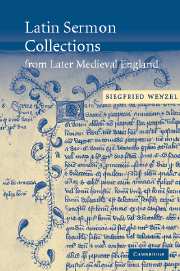Book contents
- Frontmatter
- Contents
- Preface
- Acknowledgments
- Editorial conventions
- Notes on the text
- Sigla
- List of abbreviations
- Prolegomena
- Part I The Collections
- 1 Overview
- 2 John Sheppey (SH)
- 3 Richard FitzRalph (FI)
- 4 Oxford, Bodleian Library, MS Auct. F. infra 1.2 (F)
- 5 John Waldeby (WA)
- 6 Thomas Brinton (BR)
- 7 Philip Repingdon (RE)
- 8 John Felton
- 9 Mirk's Festial
- 10 Robert Rypon (RY)
- 11 Cambridge, Pembroke College, MS 199 (P1)
- 12 Cambridge, Pembroke College, MS 257 (P2)
- 13 Cambridge, Gonville and Caius College, Ms 356/583 (C)
- 14 Oxford, Bodleian Library, MS Bodley 649 (O)
- 15 Oxford, Bodleian Library, MS Laud misc. 706 (R)
- 16 Oxford, Bodleian Library, MS Laud misc. 200 (L)
- 17 Oxford, Bodleian Library, MS Lat. th. d. 1 (Q)
- 18 John Dygon (DY)
- 19 Oxford, Magdalen College, MS 96 (CO)
- 20 Oxford, Balliol College, MS 149 (S)
- 21 Henry Chambron
- 22 Toulouse, Bibliothèque Municipale, MS 342 (D)
- 23 Cambridge, University Library, MS Kk.4.24 (B)
- 24 Cambridge, Jesus College, MS 13 (J)
- 25 Worcester, Cathedral Library, MS F.126 (X)
- 26 Worcester, Cathedral Library, MS F.10 (W)
- 27 Hereford, Cathedral Library, MS O.iii.5 (E)
- 28 Oxford, Trinity College, MS 42 (V)
- 29 Richard Alkerton
- 30 Thomas Wimbledon, “Redde rationem”
- 31 Cambridge, University Library, MS Ii.3.8 (A)
- 32 Arras, Bibliothèque de la Ville, MS 184 (254) (Z)
- 33 London, St. Paul's Cathedral Library, MS 8 (Y)
- 34 London, British Library, MS Harley 331 (H)
- 35 Manchester, John Rylands Library, MS Latin 367 (M)
- 36 Oxford, Bodleian Library, MS Barlow 24 (N)
- 37 Cambridge, Corpus Christi College, MS 392 (K)
- 38 On the margins
- Part II Occasions of Preaching
- Part III Orthodox Preaching
- Final reflections
- Inventories
- Works cited
- Index
16 - Oxford, Bodleian Library, MS Laud misc. 200 (L)
from Part I - The Collections
Published online by Cambridge University Press: 22 September 2009
- Frontmatter
- Contents
- Preface
- Acknowledgments
- Editorial conventions
- Notes on the text
- Sigla
- List of abbreviations
- Prolegomena
- Part I The Collections
- 1 Overview
- 2 John Sheppey (SH)
- 3 Richard FitzRalph (FI)
- 4 Oxford, Bodleian Library, MS Auct. F. infra 1.2 (F)
- 5 John Waldeby (WA)
- 6 Thomas Brinton (BR)
- 7 Philip Repingdon (RE)
- 8 John Felton
- 9 Mirk's Festial
- 10 Robert Rypon (RY)
- 11 Cambridge, Pembroke College, MS 199 (P1)
- 12 Cambridge, Pembroke College, MS 257 (P2)
- 13 Cambridge, Gonville and Caius College, Ms 356/583 (C)
- 14 Oxford, Bodleian Library, MS Bodley 649 (O)
- 15 Oxford, Bodleian Library, MS Laud misc. 706 (R)
- 16 Oxford, Bodleian Library, MS Laud misc. 200 (L)
- 17 Oxford, Bodleian Library, MS Lat. th. d. 1 (Q)
- 18 John Dygon (DY)
- 19 Oxford, Magdalen College, MS 96 (CO)
- 20 Oxford, Balliol College, MS 149 (S)
- 21 Henry Chambron
- 22 Toulouse, Bibliothèque Municipale, MS 342 (D)
- 23 Cambridge, University Library, MS Kk.4.24 (B)
- 24 Cambridge, Jesus College, MS 13 (J)
- 25 Worcester, Cathedral Library, MS F.126 (X)
- 26 Worcester, Cathedral Library, MS F.10 (W)
- 27 Hereford, Cathedral Library, MS O.iii.5 (E)
- 28 Oxford, Trinity College, MS 42 (V)
- 29 Richard Alkerton
- 30 Thomas Wimbledon, “Redde rationem”
- 31 Cambridge, University Library, MS Ii.3.8 (A)
- 32 Arras, Bibliothèque de la Ville, MS 184 (254) (Z)
- 33 London, St. Paul's Cathedral Library, MS 8 (Y)
- 34 London, British Library, MS Harley 331 (H)
- 35 Manchester, John Rylands Library, MS Latin 367 (M)
- 36 Oxford, Bodleian Library, MS Barlow 24 (N)
- 37 Cambridge, Corpus Christi College, MS 392 (K)
- 38 On the margins
- Part II Occasions of Preaching
- Part III Orthodox Preaching
- Final reflections
- Inventories
- Works cited
- Index
Summary
Although anonymous, this is a unified collection of Latin sermons made by a Wycliffite author. It combines a regular series of forty-two sermons on the gospels for the Sundays and major non-dominical feasts from 1 Advent to 1 Trinity (with four saints sermons included in the correct liturgical position), the last sermon ending incomplete (L-1 to 42), with an equally regular sequence of thirteen sermons for the saints’ feasts from Andrew to John the Baptist, all but one again on the respective gospel lections (L-43 to 55). Parts of the cycle have also been preserved in five other fifteenth-century manuscripts. The entire collection as a whole, both de tempore and de sanctis sermons, is unified by its use of a peculiar sermon structure and by clear Wycliffite positions of its unknown author. In MS Laud misc. 200 it is written in one hand, and the sermons contain many cross references.
The structure this author has used is somewhat reminiscent of Repingdon or of the Repingdon-derived collection M/3. Essentially the sermons here fall into two parts. In the first, the author gives a moral-psychological interpretation of the entire gospel reading. Sometimes this is done phrase by phrase, similar to the postillatio format of Repingdon, but at other times the author recounts the gospel more discursively by giving it a comprehensive moral interpretation and then going through its parts in linear order, thus achieving, as it were, a psychological narrative.
- Type
- Chapter
- Information
- Latin Sermon Collections from Later Medieval EnglandOrthodox Preaching in the Age of Wyclif, pp. 91 - 94Publisher: Cambridge University PressPrint publication year: 2005



